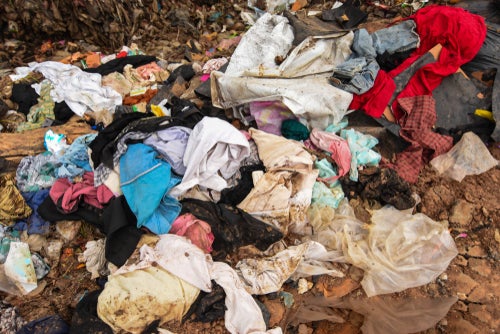The European Commission’s new proposed rules reinforces the commitment outlined in the EU Strategy for Sustainable and Circular Textiles to harmonise Extended Producer Responsibility rules for textiles and foster economic incentives for more sustainable and circular textile products.
At the core of the EU Commission’s proposal is the introduction of mandatory and harmonised Extended Producer Responsibility (EPR) schemes for textiles in all EU Member States.
The EU Commission explains that EPR schemes have proven successful in improving waste management for other products, such as packaging, batteries, and electronic equipment.
Initiative aims to boost sorting, reuse and recycling of textiles in EU
The initiative, in line with the EU Strategy for Sustainable and Circular Textiles, aims to boost the separate collection, sorting, reuse, and recycling for textiles and the EU Commission states it will create local jobs, save money for consumers, and mitigate the environmental impact of textile production.
Under the proposed rules, textile producers such as fashion brands and retailers will cover the costs associated with textile waste management, creating an incentive for them to reduce waste and enhance the circularity of their products right from the design stage.
The financial contributions made by producers to the EPR scheme will be determined based on the environmental performance of their textiles, following the principle of ‘eco-modulation.’
Access the most comprehensive Company Profiles
on the market, powered by GlobalData. Save hours of research. Gain competitive edge.

Company Profile – free
sample
Your download email will arrive shortly
We are confident about the
unique
quality of our Company Profiles. However, we want you to make the most
beneficial
decision for your business, so we offer a free sample that you can download by
submitting the below form
By GlobalData
The introduction of common EU extended producer responsibility rules will also streamline the implementation of the requirement for separate collection of textiles by member states, which is set to take effect from 2025 as per current legislation. Producers’ contributions will support investments in the development of separate collection, sorting, reuse, and recycling infrastructure.
The proposed waste management rules aim to ensure that used textiles are sorted for reuse, with any items that cannot be reused directed towards recycling as a priority.
Moreover, the EU Commission states that social enterprises engaged in textile collection and treatment will benefit from increased business opportunities and a larger market for second-hand textiles.
The proposal also addresses the issue of illegal exports of textile waste to countries ill-equipped to manage it. By clearly defining what constitutes waste and what qualifies as reusable textiles, the new law will put an end to the practice of exporting waste under the disguise of reuse. These measures will complement the forthcoming regulation on waste shipments, ensuring that textile waste is only exported when there are guarantees of environmentally sound management.
EU Commission’s proposal for revision of Waste Framework Directive
The EU Commission’s proposal for a targeted revision of the Waste Framework Directive also includes provisions related to food waste, which are detailed separately. The Waste Framework Directive serves as the EU’s legal framework for waste management, providing definitions related to waste management, recycling, recovery, waste hierarchy, and fundamental concepts.
According to the European Commission, Europe generates 12.6 million tonnes of textile waste annually, with clothing and footwear alone contributing 5.2 million tonnes, equivalent to 12kg of waste per person each year. Currently, only 22% of post-consumer textile waste is collected separately for reuse or recycling, while the remaining portion is often incinerated or sent to landfill.
Next steps for the EU’s proposal
The proposal will now proceed to the European Parliament and the Council for further consideration in the ordinary legislative procedure.
This comes after The EU’s Commissioner for Environment, Oceans and Fisheries Virginijus Sinkevičius said fashion’s global impact is no longer a requirement but a necessity with the European Commission wanting all regulations in place by 2028.
The EU’s goal is to push fashion companies to produce circular textiles that are durable, can be easily reused and recycled by 2030.
In May, the European Commission spearheaded a ban on the destruction of unsold consumer products such as textiles and footwear.


